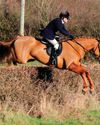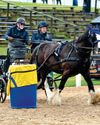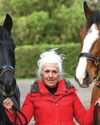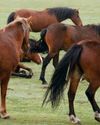
WHILE few donkeys in the UK still work as pack animals or at the seaside, many are kept as companions. A naturally calm and inquisitive nature means donkeys make excellent therapy animals, and they are often used in assisted learning programmes.
The donkey evolved from the African wild ass, in and around the area now known as Somalia. They were first domesticated in Egypt, more than 5,000 years ago, and have been closely associated with humans ever since.
With origins in an arid desert climate, where vegetation and other food sources are typically sparse, donkeys face unique health challenges when living in cooler, wetter regions. The ready supply of high-quality, high-calorie feeds and lush grazing in countries such as the UK, coupled with a relatively sedentary lifestyle, has led to widespread obesity issues.
Overweight donkeys are at risk of equine metabolic syndrome (EMS), as well as laminitis. Wet, heavy ground can also be challenging for donkey hooves, which are adapted to the desert.
Hyperlipaemia, a condition that affects donkeys, miniature donkeys and small pony breeds, can also be fatal. If a donkey stops eating enough, his vital organs still require a supply of fuel — so his body begins to mobilise energy stored as fat deposits.
These free fatty acids are circulated to the liver to be converted into glucose, the main fuel used by all cells, in a process controlled by a series of complex hormonal events. Unfortunately, donkeys and small ponies are not able to efficiently “turn off” the fat release. The consequence of these high-circulating fats, termed triglycerides, is degeneration of the liver and kidneys, followed by irreversible multi-organ damage and failure.
This story is from the {{IssueName}} edition of {{MagazineName}}.
Start your 7-day Magzter GOLD free trial to access thousands of curated premium stories, and 9,000+ magazines and newspapers.
Already a subscriber ? Sign In
This story is from the {{IssueName}} edition of {{MagazineName}}.
Start your 7-day Magzter GOLD free trial to access thousands of curated premium stories, and 9,000+ magazines and newspapers.
Already a subscriber? Sign In

'Sorry, but I wasn't feeling it'
Fresh from the opening meet, Tessa Waugh hasn't quite yet been bitten by the hunting bug. Without the crisp autumnal air and cheek-pinching cold she hoped for, it's a sluggish start

New pair pull off a win
A former European Championships pony is on form with his new rider, while elsewhere former showjumpers and eventers take ribbons

Lording it over the rest
Horses who have returned from injury, a second generation homebred and a long format specialist score on the final weekend of the British season

Smith hits flying form
A \"her way or no way\" mare helps Zoe Smith to an impressive ribbon haul and a rider beats his own boss to the top spot

Jankorado hits the jackpot
Paul Sims is triumphant despite his interrupted jump-off preparation and a borrowed horse comes up trumps

Peanut
From \"dangerous, scary\" to hedge-hopping brilliance, hunting has been the making of this unstable but very lovable equine character

She's a corker
Communication, says long-standing and highly respected Belvoir master Lady Sarah McCorquodale, is the key to all, as Catherine Austen discovers

Access all areas Cavalier Centre
The Cavalier Centre is a fully accessible, state-of-the-art equestrian centre designed to improve lives through horse-based activities. Ellie May Forrester pays a visit

'Use it or lose it'
Not everyone wants to reach for the pipe and slippers at a certain age. Becky Murray speaks to some veteran horse-and-rider combos for their secrets of human and equine longevity

A new way forward
Worm control in horses is vital, but established methods will not remain effective for much longer. Tim Mair FRCVS explains why and how we need to change